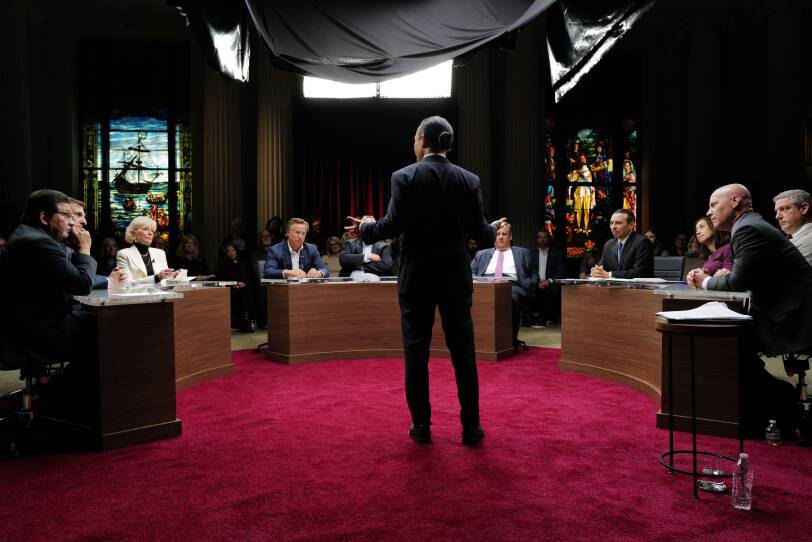“Who are my neighbors, and what do I owe them?”
It’s an idea that undergirds every episode of GBH’s dynamic new series streaming nationwide on PBS, Breaking the Deadlock, a discussion show asking panelists from across the political spectrum to grapple with ethical dilemmas and engage in civil dialogue with each other, both integral to a functioning democracy.
More than most shows on air, Breaking the Deadlock — as its name suggests — is a program with a mission. “It’s an attempt to reckon with the situation we’re in,” says John Bredar, Executive Producer and GBH Vice President of National Programming, “where there’s a breakdown of civil dialogue and people aren’t really engaging with each other or the issues.”
Intractable polarization is nothing new, of course, for a 250-year-old nation. Still, it has become uniquely challenging to address in today’s charged political climate, with social media and misinformation hardly helping matters. That’s why Breaking the Deadlock eschews the tired political debate format with talking heads shouting over one another. “You don’t have a winner or a loser,” says Bredar, “but rather we show people agonizing over difficult decisions and trying to pull each other toward a consensus.”
Initially guided by data from MIT’s Center for Constructive Communication, Bredar partnered with GBH Executive Producer Laurie Donnelly as well as co-producer and former President of NBC News Andrew Lack to reboot Ethics in America with a modern sheen and contemporary voices.
Functionally scriptless, episodes revolve around host and law professor Aaron Tang putting 12 panelists through a ringer of hypothetical situations that challenge the practical application of their political positions and ethical standards. Panelists don’t know what the scenario will be, and the only instruction they receive before taking the stage is, “Don’t fight the hypothetical.”

Selected specifically for the hypothetical situation put forward, the list of panelists reads like a “Who’s Who” of current and former elected officials, political operatives, and legal and journalistic luminaries. Viewers will recognize some guests more than others – Chris Christie, Jon Tester, Lesley Stahl, and Dr. Eddie Glaude Jr., to name a few – but they all bring their unique expertise and perspectives to bear on the hypothetical at hand.
“As far as casting goes,” says Bredar, “it’s completely dependent on the topic. You need a certain number of experts on the subject, a few people from the media, and then a balance of voices from both sides of the aisle.”
The scenarios presented to the panelists vary widely – the first one, a troubling combination of the 2000 and 2020 presidential elections with thin margins and contested results, the latter, an exploration of the limits of executive power – but the effort to foster productive discourse and find common ground is a constant.
“For the recent episode (“A Power Play”), which is about executive power, we felt it was really important to tilt the panel more to the right, because we’re raising lots of questions about how far the executive can go. But the cast is always a blend, and we’re learning as we go,” adds Bredar.
In many ways, the show hinges on the dynamism of host Aaron Tang, author and law professor at the University of California, Davis. Balancing the voices of 12 panelists while keeping the program moving and studio audience engaged is no small task, but Tang’s combination of gravitas and levity make the show hum.
“It puts a huge burden on Aaron to activate a significant percentage of the panel early on and keep them engaged throughout,” Bredar says, “but he’s so smart, funny, and nimble in the ways he navigates the conversation.”
Can you weaponize the justice system?
What happens when the right to protest runs up against the right to (safely) vote?
At what point will someone step out from a corrupt system to say, “This is wrong; I will not do this.”
These are just a few of the thorny questions panelists (and viewers) wrestle with in the first two episodes, and the results are equal parts edifying, tense, and entertaining, a fascinating glimpse at handpicked participants sweating, struggling, or easing their way through increasingly fraught sociopolitical quagmires.
“This is still entertainment, of course, but we’re trying to be substantive at the same time,” says Bredar. “It’s been so encouraging seeing how hungry the audience was for something like this.”
“PBS loved the 2024 pilot episode [recently nominated for an Annual News and Documentary Emmy Award in the category of ‘Outstanding News Discussion & Analysis’] so they ordered up four more.”

As for his hopes for Breaking the Deadlock, Bredar returns time and again to the importance of democratic norms. “You can have all the processes and laws you want, but if they’re not respected and followed, then you’re undermining the glue that holds the whole thing together.”
“Our system presumes a certain level of education among voters, and a commitment to the enterprise. Anything we can do to reinforce that with viewers is a goal achieved.”
Ultimately, what makes the program special is exactly why it belongs on GBH. “The truth is nobody else would develop or run a show like this,” Bredar adds. “Andrew Lack, who worked in the network news ecosystem for decades, even told me, ‘Nobody else [besides PBS] would bother to make this show. They wouldn’t commit to it. They wouldn’t stand by it. They wouldn’t nurture an audience.’”
“Moreover, it feels so integral to the mission of public media and GBH specifically. Our job, to quote the late great Gwen Ifill [of PBS News Hour], is “to bring light, not heat.”
Stream Breaking the Deadlock on PBS.org, YouTube, or the PBS App, and keep an eye out for new episodes in the coming weeks!
The programs that inspired Breaking the Deadlock, Ethics in America and its predecessor, Fred Friendly Seminars, both aired on PBS for more than a decade, respectively. You can find original episodes of Fred Friendly Seminars on the American Archives of Public Broadcasting website.





